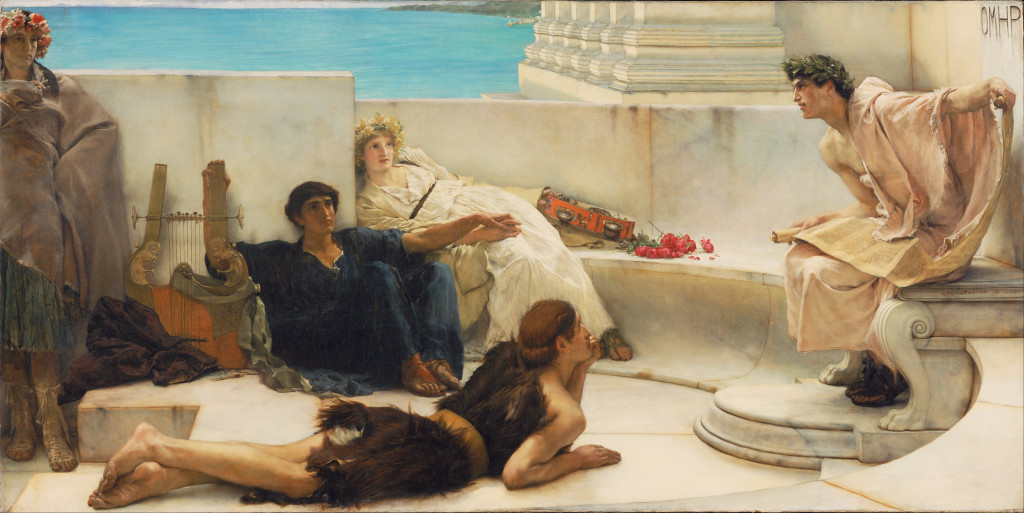It’s always heartening when political commentators in major newspapers sing the praises of literature. Nicolas Kristof, famous for traveling all over the world and writing about its suffering, talked recently of the value of Homer, Hemingway, Toni Morrison, Jhumpa Lahiri, and Khaled Hosseini.
The article is about the values of a liberal arts education in today’s world. Kristof describes Homer as mandatory reading for those wrestling with tough ethical decisions, such as the ones encountered by companies like Facebook, Twitter, and Google and by companies engaged in genetic engineering. Here’s Kristof describing the challenges:
We need people conversant with the humanities to help reach wise public policy decisions, even about the sciences. Technology companies must constantly weigh ethical decisions: Where should Facebook set its privacy defaults, and should it tolerate glimpses of nudity? Should Twitter close accounts that seem sympathetic to terrorists? How should Google handle sex and violence, or defamatory articles?
In the policy realm, one of the most important decisions we humans will have to make is whether to allow germline gene modification. This might eliminate certain diseases, ease suffering, make our offspring smarter and more beautiful. But it would also change our species. It would enable the wealthy to concoct superchildren. It’s exhilarating and terrifying.
Homer reminds us that we are not gods but human beings:
In The Odyssey, the beautiful nymph Calypso offers immortality to Odysseus if he will stay on her island. After a fling with her, Odysseus ultimately rejects the offer because he misses his wife, Penelope. He turns down godlike immortality to embrace suffering and death that are essential to the human condition.
Kristof also mentions a 2002 report from the President’s Council of Bioethics that quotes the Old Man and the Sea. The report draws on Hemingway as it sorts through the difficult ethics of embryo research, noting that embryos deserve a special moral respect that can be lost in routinized and corporate research—but that it is also possible “to have reverence for a life that one kills.” I tracked down the Hemingway allusion in the report:
As we have noted, many proponents of cloning-for-biomedical-research (and for embryo research more generally) do not deny that we owe the human embryo special moral respect. Indeed, they have wanted positively to affirm it. But we do not understand what it means to claim that one is treating cloned embryos with special respect when one decides to create them intentionally for research that necessarily leads to their destruction. This respect is allegedly demonstrated by limiting such research – and therefore limiting the numbers of embryos that may be created, used, and destroyed – to only the most serious purposes: namely, scientific investigations that hold out the potential for curing diseases or relieving suffering. But this self-limitation shows only that our purposes are steadfastly high-minded; it does not show that the means of pursuing these purposes are respectful of the cloned embryos that are necessarily violated, exploited, and destroyed in the process. To the contrary, a true respect for a being would nurture and encourage it toward its own flourishing.
It is, of course, possible to have reverence for a life that one kills. This is memorably displayed, for example, by the fisherman Santiago in Ernest Hemingway’s The Old Man and the Sea, who wonders whether it is a sin to kill fish even if doing so would feed hungry people. But it seems difficult to claim – even in theory but especially in practice – the presence of reverence once we run a stockyard or raise calves for veal – that is, once we treat the animals we kill (as we often do) simply as resources or commodities. In a similar way, we find it difficult to imagine that biotechnology companies or scientists who routinely engaged in cloning-for-biomedical-research would evince solemn respect for human life each time a cloned embryo was used and destroyed. Things we exploit even occasionally tend to lose their special value. It seems scarcely possible to preserve a spirit of humility and solemnity while engaging in routinized (and in many cases corporately competitive) research that creates, uses, and destroys them.
Finally, Kristof points out how literature nurtures a rich emotional intelligence that deepens our relationships with those around us, offering us “lessons in human nature that help us decode the world around us and be better friends.” He mentions three minority writes who have helped build “bridges of understanding”:
Toni Morrison has helped all America understand African-American life. Jhumpa Lahiri illuminated immigrant contradictions. Khaled Hosseini opened windows on Afghanistan.
Although Kristof’s column left me cheering, I’m still scratching my head over why he concludes it with a John Adams quote that partially contradicts his major point. Writing to Abigail in 1789, Adams seems to buy into certain stereotypes of poetry and the arts:
I must study Politicks and War that my sons may have liberty to study Mathematicks and Philosophy. My sons ought to study Mathematicks and Philosophy, Geography, natural History and Naval Architecture, navigation, Commerce and Agriculture, in order to give their Children a right to study Painting, Poetry, Musick, Architecture, Statuary, Tapestry and Porcelaine.
Unlike Adams, I think poetry should be taught at the beginning, not the end. The ancient Greeks, after all, taught The Iliad to young men so that they would become better citizens and warriors. Poetry wasn’t just a frill that one indulged in after others had done the heavy lifting in politics and war.
Still, Adams created a country where I get to read and teach poetry. I’m very grateful.
